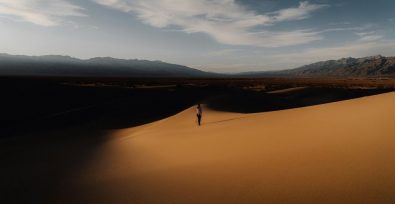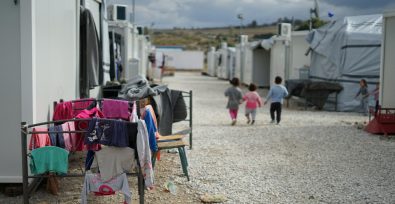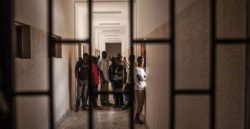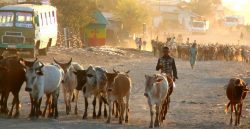A true story written by Roland Ibanda
Edited by Geneviève Appleton
The challenges of poverty, political instability and unemployment as well as the effects of broken families have increased pressure on the rising population in less developed countries in Africa and Asia.
To survive financially, every year thousands of young women flee to the Persian Gulf to seek employment in the domestic service sector, with United Arab Emirates, Saudi Arabia, Oman, Kuwait, Qatar, Bahrain and Jordan among the most popular destinations.
Sarah was one of them, saying farewell to her three children in tears, but promising a good life to them upon her return.
Sarah’s story was told to me by Sophie, her childhood friend and a survivor of the “Kafala” system of employment abroad. It was the afternoon of May 20, 2019 when I visited Sophie as she lay in her sick bed at Jinja Hospital, where she had been receiving treatment for the past couple of weeks since her return.
Upon my arrival, Sophie anxiously looked away for a moment, as if trying not to resurrect the memories locked away in the deepest recesses of her mind, drag them forth, and feel the pain they would force her to relive. When she finally looked at me, I felt afraid of what I was about to hear, but I knew that recording her story would be the only way I could help her.
A tough life at home
It all began in Mayuge, where Sophie and Sarah, a 29-year-old single mother, grew up. Sarah had three children from two different fathers who had abandoned them, making her the breadwinner for her kids of 11, 8 and 5.
After a series of evictions, several days and nights without food, her kids forced to drop out of school for lack of fees, and moving from place to place, Sarah was having difficulty surviving due to trivial pay, stiff competition in the job market and, most of all, the growing needs of her family. Despite all these challenges, Sarah never gave up on her pursuit for a better life for herself and children.
Sophie was reunited with Sarah when she visited her parents after many years away. Their reunion was a turning point in Sarah’s life. Sophie took her to Jinja City where she found a housekeeping job. She brought her kids to live with her and put them back in school. She was exposed to many things, among which were rounds of posh adverts on TV and radio about fancy jobs overseas. For Sarah, this seemed like a golden opportunity, as it did for thousands of other desperate and unemployed people countrywide.
The struggle to make the maiden trip
“At the time, I didn’t know anyone but sharing the idea at the hair salon where I worked, one of my clients promised to help us through her boyfriend who knew some agents,” Sophie explained. “The guy led us to an office in Katwe, a Kampala suburb where all initial travel arrangements were made.”
They met two other men and a woman who were busy interviewing other applicants.
“With pictures of the happy faces of young girls and certificates hanging on the walls, we believed everything they told us and that the company was legitimate. They promised us well-paying jobs in supermarkets in Jordan, earning 1. 5 million Uganda shillings ($400) a month.”
The journey to Jordan began at about midnight from somewhere in Kampala, where their documents were taken from them. All applicants were packed inside a container truck with their belongings and set off. They traveled all night and were finally smuggled into Kenya via a quiet woodland border point near Namisindwa in Eastern Uganda. The next day, the journey continued through mainland Kenya up to a deserted warehouse in Kasarani, a Nairobi suburb. At this place, more girls were waiting. From there they were transported in small groups to Jomo Kenyatta International Airport where they flew to the Gulf.
Dream job turns into a nightmare
The women were picked up from the airport by a Jordanian agency and taken to an office in As-Salt, North West of Amman. Different contract forms were presented to them depending on their nationality.
As Sophie explained,
“The writing was in Arabic, so we were forced to sign without understanding what we were agreeing to, only to learn later that we would be earning 140 Jordanian Dinar ($200) a month for domestic work.”
At a point of no return, life had to go on. Sarah and Sophie were hired by the same employer and first to leave as Ugandans were among the lowest paid. He took them to a seven-floor complex in Sahab, south of Amman. It was occupied by 20 people from the same family living in five different households.
“We had to do everything for everyone, mostly outside, like washing and rinsing clothes with our bare hands even though washing machines were available, and paving the compound with stones out in the hot sun where we suffered sunburn that scarred our faces and arms.”
“Working tirelessly for 19 hours a day without enough food and water in searing heat, I fell ill. I thought, ‘I am going to die here,” said Sophie, adding that their employer confiscated their phones so their friends and families wouldn’t know where they were.
“I cried and pleaded to our employer to release us, but he would only do so if we refunded the 1500 dinar [$2,100] he had paid to the recruitment agency in Amman.” He said, ‘You’re my slaves now and you’re going nowhere.’ Having lost all hope, we could do nothing but cry.”
Perhaps due to the stress of their situation, Sophie experienced a horrible menstrual period and bled massively for several days. She tried to ask for help from the wife of her employer but the latter beat her with an electric cable, smashed her head on the wall and dragged her out of the house by her hair, ordering her straight back to work. She continued scrubbing the compound in the blazing sun as Sarah looked on from the balcony where she was hanging clothes. Very tired, hungry and thirsty, Sophie felt dizzy and collapsed.
“Waking up, I realized I was locked up alone in a hospital room, lying on a bed with IVs in my hand.”
Despite her pleas for release, she was returned to the house. There she found Sarah bruised and in a very bad shape.
Alone and cleaning the apartment of the brother who was traveling with his family, the boss had come in, held a knife to her throat and sexually assaulted her. The next day, he returned with two other men and all the three gangraped her.
“I found Sarah bleeding terribly. She could not go to the toilet for nearly three days because of the pain.”
Four months later, Sarah realized she was pregnant. Sex outside marriage is a criminal offense under Jordanian Law, so, fearing imprisonment and being forced to bear her rapist’s child, Sarah leapt from the 7th floor.
“I still see that vivid image of Sarah’s body lying lifeless in the sand to this day and always will.” Tears rolling from her eyes, she softly sobbed, “I am so sorry, Sarah. It was my fault… I made it home and you didn’t. What will I tell your kids?”
Of course it was not Sophie’s fault at all. Sarah’s tragic fate was caused by the systemic failure that forced her to pursue the economic security she should have found at home in Uganda.
And only a few months later, Sophie herself died of multiple organ failure. Her family had been unable to afford the medication she needed to recover from the abuse she had sustained as a victim of human trafficking.
© Roland G. Ibanda
Author & Founder, Birthing Dreams Africa
P.O. Box 1947 Jinja, 5310 Uganda
Mobile: +25 675 254 0086
Email: [email protected]
~~~~~~~~~~~~~~~~~~~~~~~~~~~~
Roland George Ibanda is a writer living in Jinja, Uganda. To support his siblings and his single mother while she struggled with serious health problems, Roland started working at the age of 8. Later he became a painter and exporter of artworks and other African goods. He is currently developing several fiction and non-fiction projects, including his semi-autobiographical feature film “Bitter Smiles,” about a young Ugandan boy who grapples with the challenges of poverty, war and the failing relationship between his mother and alcoholic father, which is in development with producers Maynard Kraak of West Five Films in South Africa and Phyllis Laing of Buffalo Gal Pictures in Canada. Devoted to humanitarian work, Roland also volunteers as an interpreter and translator for the Women Integrated Empowerment Development Project (WIED) and as an emergency rescue and relief worker for refugee children.
Roland’s editor Geneviève Appleton of White Wave Productions and Resounding Media Inc. has teamed up with his longtime mentor Phyllis Laing to help support his poverty-stricken family while he researches and writes the stories of victims of human trafficking and female genital mutilation. In 2019, Roland incorporated the non-profit Birthing Dreams Africa (BDA) to pave the way for those victims achieve more than mere survival: to live a purposeful life to their full potential. Through this campaign he is also seeking partners and sponsors to support BDA’s mission:
https://www.gofundme.com/f/help-roland-support-his-povertystricken-family








-
Follow us on Facebook
5.6M
-
Follow us on Twitter
32K
-
Follow us on Instagram
8K
-
Subscribe to our Youtube
5.7K
Donate